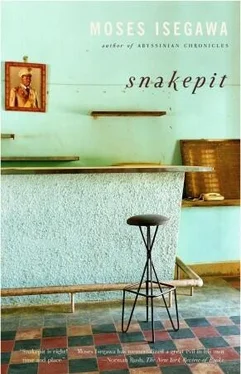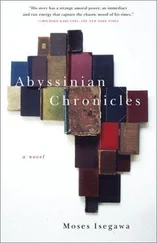On arrival, Bat heard that he had acquired a namesake.
“I am overjoyed, Sister,” he said, squeezing her hand and looking in her eyes.
“It is a very good coincidence,” Babit remarked, wondering whether she was really barren. The sight of babies had started to hammer her with doubt and a string of questions. Bat’s indifference to the subject just seemed to make it worse for her. She imagined the joy he would have felt had he come from captivity expecting a son. She imagined herself in Sister’s place, flat on her back, propped by white pillows, smiling, receiving homage. The stark white room, with the green bed and the casement window, looked like a sweet cross to carry and get crucified on before entering the paradise of motherhood.
“I am so lucky to have a sister like you,” Bat said loudly, as if addressing a big audience. “Calling Villeneuve was the most important move in the whole drama.”
“I kept blaming myself that I had not done enough. I would lie here and curse myself for not being in the city trying.”
“I knew you were doing your very best, Sister,” he replied, squeezing her palm. Tears filled her eyes. For a moment he felt extremely close to her, as if he knew everything about her and would remain by her side forever.
“Brother-in-law, welcome back,” Mafuta said, marching into the room. “It is a relief to see you back.” He squeezed Bat in an impromptu bearhug.
“I appreciate the effort you made on my behalf. A son is a fitting reward. Congratulations.”
“Thank you. A historical baby in family terms,” Mafuta said, glowing with pride. This was his creation, the best thing he had ever done. He was euphoric. All the pieces of his life seemed to have fallen into place. He seemed to have won a victory over Bat. He had a son, somebody like him; Bat didn’t. He felt grateful for the moment. He wanted to stretch it out before gloom, competition, jealousy, tarnished and swallowed it.
Bat found the town small, uninspiring. It did not evoke any tender feelings in him. It was just another shapeless entity astride the road. Rural life bored him; it constricted him. It looked frozen, caught between the past and the future, as if afraid to advance or retreat. Having grown up among farmers, listening to their complaints about fluctuating crop prices, he now felt how cut off they were from the centre of power, government, decision-making. He had vowed never to find himself in such a predicament in the future. It was one of the reasons why he wanted to stay in Uganda. Here, he could move things; abroad, he would be on the periphery, a refugee trying to find a foothold. He always believed that the city and the big towns were the place to be. If they were dangerous and unpredictable, that was a fair price to pay.
Bat did not understand his sister’s thinking at times. What did she see in this place? What if something had gone wrong with the delivery? Would she have made it to Mulago Hospital for surgery? Why she had chosen nursing puzzled him. Spending one’s life with the sick, the injured, the needy, didn’t look that appealing. That she could be so close to filth and still retain a smile on her face defeated him.
The days he and Babit spent in these mosquito-bitten back-waters visiting his family passed slowly, sodden with beer, flatulent with overeating, saturated with the same stories. He told his story and heard it retold till it became formless, almost unreal. It made his secrets seem very precious, close to his heart, privy to a handful of eyes. These people seemed to know him, and he kept thinking that there was a lot they didn’t know. In some eyes he had already become a hero, somebody who had conquered death. The power of astrology had also been inserted into the saga. Some claimed that it had been Dr. Ali who had freed him in a dream. Bat found this curious, and he asked his brother why he had sacrificed the bull so openly. But then he understood the desperation caused by his disappearance. He decided to accept it all, although the glorification and mythicization bored and bothered him.
He realized that he was not fulfilling any useful purpose in these areas. He seemed to be getting in the way of his myth. His departure served everybody better. He would then love them because he would not have to deal with them. They would love him more because his myth would become more malleable, easier to forge into different shapes. They could then turn him into a politician, a fighter, whatever they wanted.
BAT SPENT his time preparing for his return to Britain. He had got his XJ10 back, even though he felt uneasy about driving it. Jobless, he felt he did not deserve to drive such a prestigious machine. He continued to use it only because soldiers still let him pass roadblocks unchecked.
Babit was both scared and excited by the journey. She wanted to see the other world, and thank the man who had helped free her husband, but she was afraid of losing the familiar. Uganda was still the font of her fondest memories, the cradle of the people she loved, the source of the hopes she cherished.
Her parents, on the other hand, wanted the pair to go away and get over the shock, and cement their love. They were afraid that if Bat stayed in the country he might get into more trouble. “Every evil wind has to be given an outlet to pass,” her father had said.
Bat spent an evening with Babit’s family. They were farmers cultivating tea. They had been in the business for decades. From their earnings they had built a brick house, educated their children, and put something aside for their old age. They kept most of their political views to themselves, but let it be known that they had supported a progressive party and were ready to do so again when things changed. They expected Babit to set a good example for her younger sisters by marrying. Bat liked the contrast between Babit’s parents and the people of his village. These people listened to his story carefully, asked questions, sympathized and were not out to create heroes. He left feeling quite close to them.
“Are we going to come back?” Babit asked that night, worried that like many people these days they might be embarking on permanent exile. They slept at a neighbour’s house because traditionally it was improper for them to share her parents’ house.
“We are going for a holiday, not to settle there, dear.”
“Won’t you be tempted to stay?” she asked, thinking that normally only rich people travelled or went for holidays. Finding herself in those circles frightened her.
“I know Britain quite well. I have no plans to spend the rest of my life there.”
“But last time you had no money.”
“Stop worrying, you will love it.”
“I will start looking for a job when we return. What if the government throws us out of the house?”
“Don’t worry about money. I will get a job when we return. If not, I can always borrow from Kalanda.”
BABIT HAD BEEN RIGHT. Britain felt different this time. It had lost its power to bully and intimidate him. They had travelled to Kenya and caught a plane to London. Bat loved the luxury; Babit felt uncomfortable, always worried how much it all cost. She was not used to being served by white people and she felt insecure about her English.
“We are paying for everything, service inclusive,” Bat explained. “If you want anything, just ask, even if it is something to vomit in.”
This was the first time he noticed the difference in their academic backgrounds; before, it had been a joke. It did not bother him at all because he separated work from home, and if Babit was vulnerable, it was his job to take care of her. She seemed to believe that people noticed that she had never been on a plane before, that she did not know London, that many English accents baffled her. At this Bat laughed.
Читать дальше











